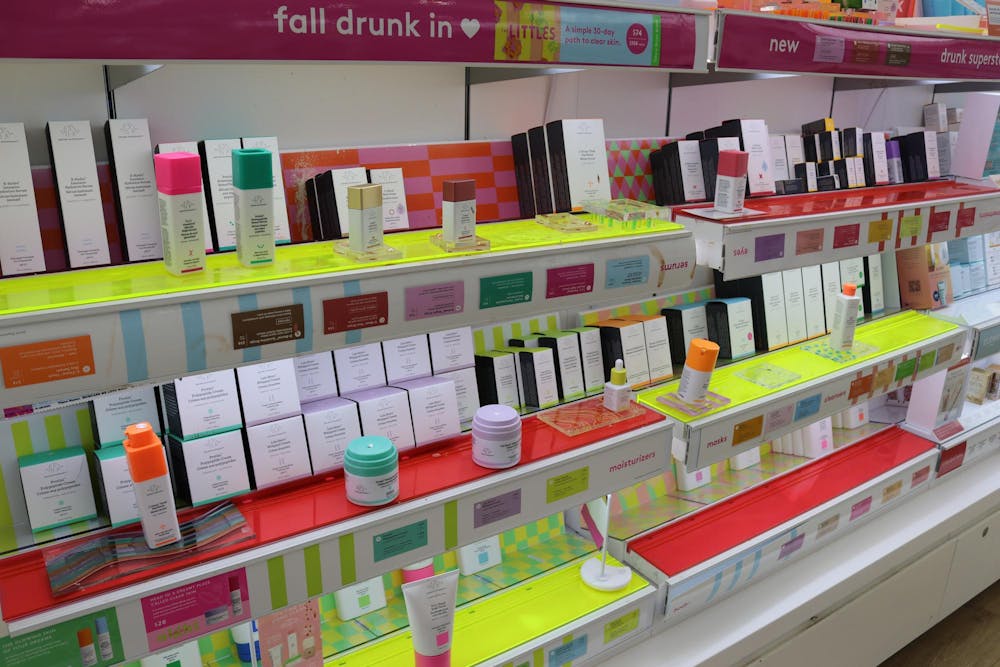I didn’t seriously think about skincare until I entered high school. Sure, I washed and moisturized my skin with drugstore brands like Cetaphil and CeraVe, but by no means did I adopt a regimen of toners and serums until much later. Given my adolescent self’s lack of knowledge on skincare and beauty, it’s absolutely wild to see how intense and thorough the skincare and makeup routines of kids are today.
If you’re on TikTok, you may have come across a video of a preteen showing off their latest haul from Sephora. Most notably, celebrity kids like North West and Penelope Disick will upload “Get Ready With Me” (GRWM) videos on TikTok, often featuring high-end products from brands like Drunk Elephant and Dior. But celebrity kids aren’t the only preteens with expensive and chemically-loaded beauty routines.
The phenomenon of children becoming beauty connoisseurs is so widespread that social media has coined the term “Sephora kids” to describe it. These kids are preteens who go into retail stores like Sephora and Ulta Beauty to shop for trending skincare and makeup products, while also showcasing the products they buy in hauls and GRWM videos. There is a lot of online criticism against Sephora kids, leading one to question why preteens today are using an abundance of makeup so much earlier than the generation that came before.
Perhaps the kids of today are just a product of their environment. Generation Alpha, which includes children born from 2010 to 2024, has more exposure to technology and social media than any generation before it. According to media research organization Common Sense Media, 71% of 12-year-olds own a smartphone as recent as 2021. Most kids today have never known a childhood without access to social media, and this makes them especially susceptible to trends and influence.
Brands like Drunk Elephant and Sol De Janiero are especially appealing to kids because the packaging is colorful, includes fun product names and feels fresher than older brands like Clinique and Estée Lauder. While the adoption of a skincare routine at any age can be good, it’s also crucial to talk about the harmful effects a blind investment in beauty can have on young skin.
Many preteens online are using retinol and other strong chemicals in their skincare routines. Retinol is an active ingredient in many serums and creams that not only targets acne but also prevents wrinkles. It’s typically reserved for older adults, but has made its way into the hands of young kids. What’s scary about retinol use among kids is that it can actually damage the skin barrier if used without reason on young skin, leading to adverse effects like irritation, redness, drying and sensitivity.
Furthermore, beauty brands are actively capitalizing on young audiences and their desire to emulate the appearances and habits of influencers. Brands are constantly teaming up with TikTok influencers whose videos are repeatedly pushed toward young audiences. Alix Earle, a Miami-based influencer whose audience includes over six million followers, has famously promoted the products of brands like Rare Beauty, Tarte, Rhode Skin and Too Faced. Other famous influencers like Meredith Duxbury and Mikayla Nogueira also get paid to use specific brands in their GRWM videos.
In knowing the high usage of TikTok by Generation Alpha, these brands are banking on the fact that they can influence kids to not only buy products they don’t necessarily need but also ridiculously expensive products. Drunk Elephant’s popular Protini Polypeptide Cream, for example, is sold for $68 at Sephora and Ulta Beauty. There is no universe in which it should be normal for kids or their parents to spend that much money on moisturizer for young skin.
Given the criticism Sephora kids are facing online, it’s important to recognize that the desire for perfect skin is also a result of the age-old narrative that clear skin is the ultimate marker of beauty in society. But this narrative is incredibly flawed. Self-worth should never be contingent upon one’s appearance, and brands should be held accountable for upholding impossible beauty standards.
Despite this harmful rhetoric, the Sephora kids’ investment in skincare and makeup isn’t all bad. Learning more about the importance of skincare at a young age can help young people form healthy habits early on. While children don’t need retinol, it’s incredibly important to communicate the benefits of a gentle face wash, moisturizer and sunscreen.
Additionally, an early investment in skincare and beauty can also help young people develop a passion for self-expression. Just look at it like an art form: experimenting with different products and painting your face with different colors can help young people explore different facets of creativity. And while it’s imperative for all ages to know they are just as beautiful without makeup, it’s also true that using makeup to enhance one’s natural features can boost self confidence.
While Generation Alpha’s investment in beauty raises some serious concerns, it’s not going away anytime soon. Rather than make a mockery of Sephora kids, it’d be more effective to encourage the parents and industry professionals to foster open communication about the complexities of societal expectations in beauty and how these can be damaging. Focusing on the safest products kids can use to express themselves and develop healthy habits is the best way to navigate this unprecedented time in beauty history.
Erin Stafford (she/her) is a senior studying journalism with a minor in English.





